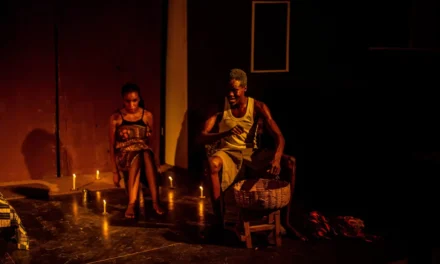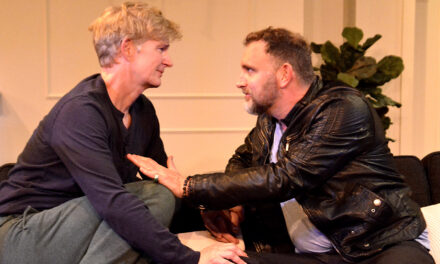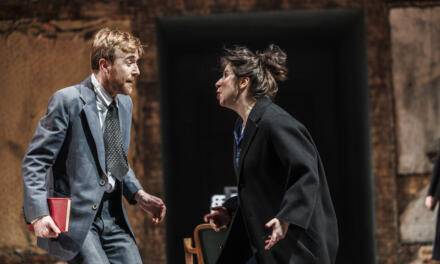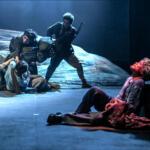With nearly 4000 shows at hundreds of venues in the city, the Edinburgh Festival Fringe is a kind of beautiful chaos that is impossible to distil by a single person in a single article. To be precise, a single person could – according to the calculation here – squeeze in only 320 shows this year if they watched a taxing 12 or 13 performances a day every day of the month. But that too would require a superhuman effort not taking into consideration economic limitations, time availability, weather conditions, navigability of the local terrain, personal taste, and also partly one’s own echo chamber.
I managed to see 16 shows in three days, mostly in and around the Summerhall venue, near which my accommodation was located. Very few of the companies and artists I was familiar with or would have wanted to see were back in town, but luckily the first round of the Scotsman Newspaper’s weekly Fringe First awards had been released just in time for my trip offering an extra level of recommendations.

My English Persian Kitchen, by Hannah Khalil, based on the story by Atoosa Sepehr, Directed by Chris White. Photo credit: Ellie Kurttz.
That said, two of the Fringe first winning shows I chose had reached their maximum allowance of press tickets, but I did get into My English Persian Kitchen at the Traverse, the show that generated extra buzz by offering soup to the audience on the way out, cooked fresh in the course of the performance. The show is based on the life story of Atoosa Sepehr, an Iranian businesswoman and now a bestselling author of a Persian cookery book, who only learned to cook in exile in England due to homesickness. The play is scripted by Palestinian-Irish writer Hannah Khalil, and performed, with considerable charm, by Italian-Iranian actor Isabella Nefar. There is a deliberately stark contrast between the main character’s cosy sense of ‘here and now’ and a horror-like sense of her ‘there and then’ overshadowed by memories of domestic abuse, and emphasised in this production by director Chris White’s sometimes literal choices. However, this show is a more than deserving laureate, especially in the aftermath of the UK’s horrific anti-immigration riots last month; and long may it delight its audiences on tour.
The second Fringe First-winning show I managed to see was an equally deserving Border at the Grotowski Institute’s temporary Edinburgh venue the Cube. Created by performer Monika Wachowicz and director Jarosław Fret, the piece was a raw and laudably unsentimental ritualised homage to Antonina Romanova, a queer Ukrainian theatre and performance-maker currently fighting in the war against the Russian aggression. As Romanova’s alter ego on stage, Wachowicz gives us a brief intro into the genesis of this piece and then proceeds to gradually arrange the stage space into a sort of live installation that will serve as a set, an altar, and eventually as a frame for a searing final image that will gradually emerge in order to uncomfortably haunt our memory on departure. In the meantime we watch Antonina’s materials on screen: a vox pop in which she speaks simply and without pathos about her and her husband’s life as soldiers – a testimony punctuated with sounds of explosion in the distance and enhanced by a brief appearance of a stray dog named Orlando whom the soldiers have adopted (together with another stray called Bloom) to shield them from the terror of war as much as they can. This is later counterpointed by Antonina’s angry manifesto about theatre and truth which we read on screen, and eventually a video of her naked in a deserted room, writing with her own blood onto a paper installation similar to the one Wachowicz is replicating on the stage in front of us. The Border is a poignant piece that asks urgent questions about the purpose of art at the time of war and also very subtly but uncompromisingly about our own agency in it.
Audience agency is a theme, in less critical ways, elsewhere in the festival too. But this has been the object of formal experimentation for quite a while at the festival now. For old time’s sake, I revisited a classic at the Paines Plough Roundabout tent pitched at Summerhall each August, which has been running for 10 years now: Jonny Donnahoe and Duncan Macmillan’s Every Brilliant Thing. This piece famously enlists the audience on arrival to read individual lines in the course of the story about a man who when he was ten started making the list of every brilliant thing for his mentally ill mother teetering on the brink of suicide. Being seated in the round, the audience are simultaneously the mise-en-scene and co-performers, a community, a wedding party, and ultimately a support group too that aids the protagonist on his path of acceptance. The interplay of form and content – and tears and laughter – results in a uniquely life-affirming piece that binds the audience together in recognition of the importance of destigmatising mental health issues.

Or What’s Left of Us, by Sh!t Theatre, with Louise Mothersole and Rebecca Biscuit. Photo credit: Claire Nolan.
A similar effect of blissful communion blending comedy and tragedy in the form of a ‘folk singaround’ is offered by Sh!t Theatre: Or What’s Left of Us. Other than saying it features English folk songs delivered with Sh!t Theatre’s trademark wit, irony, musical talent and conceptual cleverness – as well as some fun alcoholic audience participation – it is difficult to say much more about the main subject of this piece without creating spoilers. But let’s say one of the clues is in their opening number ‘John Barleycorn Must Die’. While fusing notions of nature-inspired ritual, drinking, death and revival, as it repeats throughout the show, the song gradually acquires new, uncomfortable and even philosophical levels of meaning. This is a piece of performance that comes from darkness and unimaginable pain but one that Louise Mothersole and Rebecca Biscuit deliver with extraordinary lightness and effervescence – even when tenderly wiping real tears from each other’s faces. And then they follow it up with a support group gathering at the bar.
While we are on the topic of life and death – the latter a theme still running strong at the Fringe in the aftermath of Covid-19 – we cannot circumvent the sell-out hit by Oliver Emanuel and Gareth Williams, A History of Paper. A perfect romantic story told through paper props and piano music, it is a piece brimming with memorable lines that in the aftermath of the author Oliver Emanuel’s premature death from brain cancer aged 43 last December – acquire a new poignancy. ‘Love is short, but forgetting takes a long time’ is the play’s opening line. Or, for those who knew the author: ’Is it better to feel the pain of remembering or to never have had the memory?’. The play’s protagonists – a bookworm with a difficulty in letting go (played by Christopher Jordan-Marshall) and an adventure-hungry journalist (Emma Mullen) – fall in love on the eve of the year 2000 when the fears about the end of civilisation are at their peak. For the man the end of paper equals the end of civilisation so he keeps a paper trail of everything, including their relationship: postcards, restaurant menus, confetti from their wedding too. Andrew Panton’s production is so light on its feet that at times it feels like a children’s show. But as in much of Emanuel’s other work, death is part of the story here too, not as tragedy but as a source of transformation for those that stay behind, a processing of grief into something empowering and transcendent. It turns the memory of this show itself into a lasting memento.

Common Is As Common Does: A Memoir, by 21Common. Directed by Lucy Gaizely and Gary Gardiner with Dan Brown.
A History of Paper is part of the Made in Scotland Showcase 2024, which features another 13 productions including dance, music and mixed genre performances. I also caught the dance theatre piece Common is as Common Does: A Memoir by 21Common, a Scottish collective led by Lucy Gaizely and Gary Gardiner dedicated to rethinking and expanding what it means to be an artist so to include those from under-represented backgrounds. Their previous works Dancer (2014) and The Ballad of the Apathetic Son and His Narcissistic Mother (2016), made in a similar vein, have reached an impressive range of international audiences through touring, adding a sense of considerable track record and self-assurance to this company’s distinctive performance style. It is through singing, however, that they make their opening gambit in this show. The idea is, we find out as we progress, to look beneath the seductive surface of classic easy listening hits such as ‘You Don’t Have to Say You Love Me’ by Dusty Springfield and ‘You Are My Destiny’ by Paul Anka, and confront the hidden violence these song lyrics actually communicate. In addition to karaoke singing, delivered by individual performers who temporarily break away from a 14-member chorus to sing their solos into the mic, the piece also consists of a storytelling container that keeps it all together courtesy of somewhat enigmatic narrator Gary Gardiner, and a continuous choral dance score that runs in the background as a kind of pulsating bloodstream of the show. Formally it is an innovative and compelling piece – a gentler, more generous and far more diverse version of a performance idiom once characteristic of Steven Berkoff and his East ensemble work, for example – and it delivers its message equally powerfully too.
When it comes to distinctive form as a means of conveying a clear political message, another resonant example in my Edinburgh Fringe experience has been Nation by Sam Ward of YesYesNoNo. Like Every Brilliant Thing, this piece at the Summerhall/ Paines Plough Roundabout, relies on audience interaction in thinking through – or rather ‘imagining’ as the author/performer repeatedly prompts us to do – what it means to be a community, what we do perceive as a threat and – significantly – what we do not perceive as one. Ward is indeed a consummate storyteller with impeccable attention to detail, and this piece of interactive performance, at times reminiscent in rhythm and purpose of Tim Crouch’s best solo work, is in fact Ward’s sixth. However, what makes it really stand out is its concept, its timing and its ability to deliver a much needed shared reflection on collective responsibility, and not only in the UK at the moment.
Another example that made me think of Tim Crouch’s work, specifically An Oak Tree (first seen at the Traverse in 2005), was Nathan Ellis’s Instructions – a piece that requires a different actor for each performance to read its script for the first time on stage without seeing it in advance. The idea is that the spontaneity and the unknown will make the performance more interesting for both the actor and the audience, though this is a risk too that requires a script with narrative clarity. Instructions goes a step further into the unknown, using advanced technology and transporting its story into the world of filmmaking and AI. Despite the initial thrill in following the actor rise to the occasion, I must say I lost a sense of clarity in what was going on as we got further down the line. Not that this will affect the ticket sales.
Elsewhere at Summerhall is another formally complex show with a great word of mouth: Louise Orwin’s Famehungry. Here the veteran performance artist, with a reputation for highly provocative, research-led and often intermedial work, places TikTok at the centre of her playful investigation. The show is livestreamed to her following framed by the game that 20 000 likes will result in her doing something amazing. (She reaches over 30k long before the end too on the day I see it.) In various ways, she more than delivers on her promise – to both sets of audience. For the virtual crowd, she breaks the usual format of repetitive, predictable content to deliver something more puzzling and suspenseful, while for the actual theatre audience she serves up a layered critique of attention economy and corporate surveillance. There are moments when she switches her livestream’s sound off so to avoid TikTok’s censorship algorithms, and then moments where she engages her TikTok research respondents and her 20 year old guru Jax, whom Orwin had met five years previously as a participant in her performance-making workshop. At the time, 15-year-old Jax was already a TikTok star with over 50 000 followers. It is a fascinating and demanding work of media analysis with exceptional anthropological insight that should probably become part of the national curriculum.
While we are on the topic of educational value, completely exceptional in this respect is Gabriele Ubodi and Samuel Rees’s Lessons on Revolution also at Summerhall. Billed as a piece of documentary theatre about the as yet unhistoricised 1968 London School of Economics student protests against the colonialist pedagogic gerontocracy of the day, the piece is an extremely rich and motivating lecture performance that reinvents both the notion of lecture and the notion of performance, and additionally urges reflection about the political present and future too. Ubodi and Rees are earnest and engaging performers although they disclaim any pretensions towards professional theatre status of their work. This is an effective ruse in removing any mystification from the performer-audience relationship. Even though the makers also ingeniously conduct a light contracting procedure with the audience on the way in where those who declare themselves comfortable to read in the course of the performance are given a sticker, they do create a ‘thirst trap’ (to borrow a term from Louise Orwin’s show) among the non-stickered audience members too. The thirst here is for action (and interaction) of various kinds, and it only remains to be hoped that the audience go on to make some kind of change from here, at least on a small scale.
There has been so much other politically driven work at this year’s Fringe, it is difficult to account for every manifestation. In my own random selection I have also seen the thoroughly charming, verbally virtuosic solo show about identity Tones: A Hip Hop Opera by Gerel Falconer at Roundabout, described in its publicity pithily and invitingly as ‘What happens if you’re not black enough for the ends, but too black for the rest of the world?’. Then, there was also Precious Cargo, also a solo dealing with identity by Australian writer-performer Barton Williams (Huynh van Cuong) and Hebridean composer Andy Yearley (Nguyen Tang). The authors here have been united by fate through their shared background as survivors of the post-Vietnam war Operation Babylift, and Williams – a gifted and supple raconteur – has also interviewed a host of other Vietnam war-born babies who have been raised elsewhere in the world, and whose testimonies form the fabric of this fascinating kaleidoscopic work. At another end of the range, trans voice and queer identity is explored in Hyper by Ois O’Donoghue in a technically inspired and assured way that deservedly wowed the audiences at the Dublin Fringe 2023.
Moving on to a sort of finish on a lighter note, I must first single out the thoroughly delightful ensemble of Trainspotting Live at Pleasance EICC. Those familiar with the film or the book will understandably expect very little entertainment here – and indeed this is the show in which at least one audience member faints by the end of every performance – however, I have rarely seen such effortlessly compelling slapstick humour in any stage show let alone one about the horrors of heroin addiction in 1990s Edinburgh. I am referring of course to the iconic ‘worst toilet in Scotland’ scene, though it is not the only one at which the audience genuinely shrieks with excitement.
Similarly rampant in spirit was the physical humour of the Danish clowning duo Don Gnu. Last year they visited the Fringe with Tourist, a whimsical (and worried) meditation on air travel. This time they treat the audience to Tennis, a self-styled riff on the 1980 Wimbledon final between John McEnroe and Björn Borg – refashioned here as DON McEnroe and Björn GNU. This was the match that originated the famous McEnroe ‘You cannot be serious’ quote, and although Don Gnu are a non-verbal company as they comically and protractedly declare at the start of the show, we are by no means at a loss about this connection. There is satire galore in this dance piece that also mixes ballet, martial arts, mating dance, rock concert, re-enactment, battle and ballroom dance in its vocabulary, but also, surprisingly, lyricism hinting at masculine vulnerability.

L’Addition, directed by Tim Etchells, performed by Bert and Nasi. Photo credit: Christophe Raynaud de Lage.
By contrast, the British-based comic and cantankerous double act Bert Lescas and Nasi Voutsas, in their latest show directed by Tim Etchells, L’Addition, are all about suave sophistication. They have been known of course to engage in metaphorical plate-smashing, mutual infuriation, and flashing of bare posteriors in their distinctive political clowning work, but the latest piece, following on from their Forced Entertainment award in 2020, is perhaps expectedly more concerned with conceptual exploration of failure. The situation is simple – though Bert and Nasi offer a prolonged and hilarious disclaimer on account of its complexity: one waiter, one customer, one bottle of wine overfilling one glass and requiring a scene change. This scenario is repeated ad nauseum, always with a small variation, but somehow never in the way that enables just the right amount of liquid to fill the volume of the glass. It brings to mind Beckett and Pinter and the British TV comedy Dinner for One, traditionally played on New Year’s Eve all over continental Europe (though strangely not in the UK). But it also brings to mind deeper thoughts on crisis, control, the state of the world we are in, where the tipping point is, and what it takes to ‘get things right’ outside of the otherwise rehearsable world of theatre.
This post was written by the author in their personal capacity.The opinions expressed in this article are the author’s own and do not reflect the view of The Theatre Times, their staff or collaborators.
This post was written by Duška Radosavljević.
The views expressed here belong to the author and do not necessarily reflect our views and opinions.



























